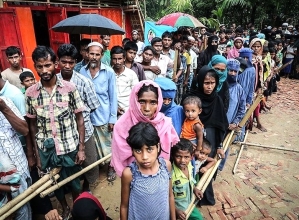
An estimated 15 Christians were among at least 40 Rohingya refugees from Myanmar (Burma) detained in New Delhi that the Indian navy on May 8 threw into the sea, the AP reported.
The Indian authorities provided the refugees, which included the elderly, children and women, with life jackets before casting them into the sea near India’s maritime border with Myanmar, according to the AP, citing U.N. sources, refugee relatives and an attorney.
The refugees swam to Myanmar island shores, but the U.N. Commissioner for Human Rights said their whereabouts in the embattled country were unknown, according to an agency press statement on Thursday (May 15).
On Friday (May 16), the AP learned from five Rohingya refugees that their family members were in the group that Indian officials detained on May 6 and flew to an aircraft carrier, where an Indian navy crew on May 8 cast them into the sea. The group included 15 Christians, the relatives told the AP.
Predominantly Muslim, ethnic Rohingya have long been persecuted in both Myanmar and India, as have those who have converted to Christianity. There are an estimated 40,000 Rohingya refugees in India who have fled persecution in Myanmar.
The U.N. Special Rapporteur on human rights in Myanmar, Tom Andrews, called India’s action a “blatant disregard for the lives and safety of those who require international protection” and “nothing short of outrageous,” the AP reported.
“Such cruel actions would be an affront to human decency and represent a serious violation of the principle of non-refoulment, a fundamental tenet of international law that prohibits states from returning individuals to a territory where they face threats to their lives or freedom,” Andrews said in a statement, according to the AP.
The U.N. Commissioner for Human Rights stated that it had appointed a U.N. expert to investigate what it termed as “unconscionable, unacceptable acts.”
“The U.N. agency urged the Indian government to refrain from ‘inhumane and life-threatening treatment of Rohingya refugees, including their repatriation into perilous conditions in Myanmar,’” the AP reported.
The news service quoted a lawyer for the refugees, Dilawar Hussain, as saying the families have filed a petition in India’s top court urging the government to arrange for their return to New Delhi. India’s navy and foreign ministry declined to comment, the AP reported.
A refugee in India who is a relative of one of those forced into the sea told the AP that most of those returned were registered with the U.N. High Commissioner for Refugees in India and were detained by Indian authorities under the pretext of collecting their “biometric data.”
The refugee, unidentified for security reasons, said he received a call from his brother on May 8 after the cast-off swam to a Myanmar island and borrowed a phone from a local fisherman. The cast-off told his brother that officials in India had removed their restraints and blindfolds, given them life jackets and told them swim to an island in Myanmar territory, the AP reported.
Another refugee forced into the sea called his brother in New Delhi, telling him that Indian navy personnel had beaten some of the Rohingya refugees in the group. The AP noted that it was not possible not independently verify this and other claims, and that a spokesman for Myanmar’s military-led government did not immediately respond to an email request for comment.
Myanmar regards the Rohingya as migrants from Bangladesh and denies them citizenship, but the Rohingya maintain they are indigenous to western Myanmar. Before the Rohingya genocide in 2017 that led to more than 740,000 Rohingya fleeing to Bangladesh, their population in Myanmar was estimated at 1.4 million.
Authorities in Myanmar impose restrictions on their movement and access to state education and civil service jobs.
U.N. officials and Human Rights Watch have described Myanmar’s persecution of the Rohingya as ethnic cleansing. U.N. investigations have found evidence of increasing incitement of hatred and religious intolerance by ultra-nationalist Buddhists against Rohingyas, and Myanmar security forces have subjected them to summary executions, disappearances, arbitrary arrests and detentions, torture and ill-treatment and forced labor against the community.
Rohingya refugees in India face persecution and attacks from Hindu nationalist groups.
Myanmar’s population is 87.9 percent Buddhist, 6.2 percent Christian, 4.3 percent Muslim, 0.8 percent animist and 0.5 percent Hindu, according to the CIA Factbook.






